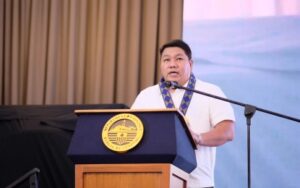📷: Former Customs Commissioner Bienvenido Rubio
It is fairly easy for President Ferdinand Marcos Jr. to revamp his government since all of his appointees serve at his pleasure. In fact, one method to guarantee that top officials will perform is to compel them to write undated courtesy resignations that any President can whip out of his valise or office safe and accept “with regret.” The Chief Executive would then look nice and the acceptance justified by the “exigency of the service.” The bureaucrat would then fade away, thanking Malacanang for allowing him or her to serve.
Was this the case in the unceremonious dismissal of former Customs Commissioner Bienvenido Y. Rubio? The ex-commissioner was not included in the first or second rounds of dismissals but one fine morning, he got the bad news, not here but overseas as he was attending a conference when the ouster came. What forced the hand of the Palace? Surely, big corporate or political interests must have worked feverishly to practically label Rubio as “inefficient” for not beating his revenue targets. It is fairly easy to divine what caused Rubio’s fall. Threats of higher tariffs by the tenant of the White House naturally had an impact on trade and the scrapping of higher tariffs on rice imports naturally reduced BOC collections. Curiously, the reduction in rice tariffs did not lead to the reduction of rice prices, contrary to the pious incantations of lawmakers who fought tooth-and-nail to enact the Rice Liberalization Law (RLL.)
As it is, one official who has the President’s ear is being tagged as the mastermind of the “massacre” at the Bureau of Customs (BOC), which generates between 30% and 35% of government revenue collections annually. However, the chief of the Bureau of Internal Revenue (BIR) was retained. BIR collects about 70% of the entire government revenue. Then biggest share of this gigantic collection comes not from large taxpayers but from wage-earners, salaried employees and government personnel whose pay is slashed at source as withholding taxes. Yet, the BOC exceeded its revenue target for January, collecting P79.343 billion and beating its target of P78.015 billion by P1.328 billion, for an increase of 8.1% compared to January 2024.
For the first quarter, the Bureau of Treasury (BTr) confirmed that BOC collected P231.378 billion, a 5.72% increase year-on-year. Had Malacanang not issued Executive Order No. 62, which reduced rice tariffs and expanded zero-import ties, the BOC would not have suffered a loss of P11.264 billion from its anticipated collection of duties. It would be a most unkind cut to dismiss Rubio and the five BOC officials for the “loss” of rice tariffs. When global trade is in the doldrums, and local businesses are cutting back on imports, whether raw materials or semi-processed products for local assembly, it would be foolhardy to blame BOC for insignificant reduction of collections.
Yet, going by the justification for the revamp, it would seem that the Palace wanted “more transparency in the collection of duties and sustained efforts to curb smuggling.” The reason advanced leaves a bad taste in the mouth since it presumes that a dark pall has dawned on collection efforts and the reduced BOC take was due to the failure to curb smuggling. The suspicion is that a top Palace banana wanted Rubio out but the revamp also entailed the transfer of one collector assigned to the Ninoy Aquino International Airport (NAIA) being shipped out to the Clark International Airport. An official from the Department of Trade and Industry (DTI) found himself appointed as deputy commissioner for the Airport Operations Coordinating Group (AOCG), presumably responsible for Clark operations.
Surely, the BOC overhaul was related to the new assignments at Clark, which the Gokongweis are now managing. Mysteriously, AirTaxi, a chartering company that has 27 helicopters and planes serving clients in various airports, also had its wings clipped. AirTaxi has been servicing Clark for a long time and businessmen are now wondering why the company suffered a devastating exit. They plead that out of “delicadeza,” anyone in government with close business links to conglomerates and taipans should not be allowed to meddle with BOC reshuffles and airport operations. The time-honored principle of avoiding conflicts of interest should be respected. They should leave their business and kinship ties at the door.
The Gokongweis own Cebu Pacific and the Luzon International Premiere Airport Development Corp. (LIPAD), which operates the Clark airport. They lost in the bidding to manage the Ninoy Aquino International Airport (NAIA) to a consortium led by Ramon Ang, now the head honcho of the New NAIA Infra Corp. (NNIC.) The Aboitizes also won biddings for the management of airports in Mindanao and the Visayas, but there is hardly any ruckus over the way they secured their awards. Winning deals fair and square is already a victory for corporations and the bureaucracy responsible for biddings.
Government wants to improve its cadre of professionals but it cannot be achieved when those entrusted with authority and assigned to serious economic tasks continue to think in terms of family and class. Of course, that is a bad combination as graft eventually becomes fashionable. Too much power in the hands of geniuses is not an ironclad guarantee that such power will not be abused. Leaving them to do as they please is a formula for disaster.




